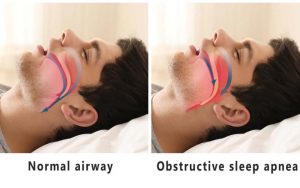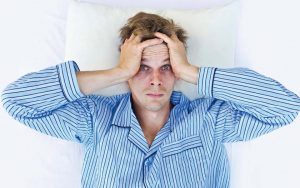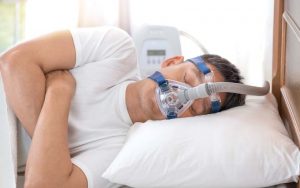I can sleep anywhere, any time – even during the day. I don’t have a sleep problem. Does this phrase sound familiar to you? Do you or someone you know say this constantly?
If yes, there may be probable cause for concern as it may ironically, be a sign of sleep apnea – a condition in which a person stops breathing at night whilst asleep. This interview with Datuk Dr Kuljit Singh aims to explore all aspects of the condition – its causes, symptoms, and treatment methods.
Q: What Is Sleep Apnea?
A: It’s a condition whereby a person stops breathing while they are asleep – the window of time in which their breath ceases is known as apnea. These apneic periods may last from a couple of seconds up to a minute – at which point, the human body’s breathing mechanism will often be triggered again. While 5 or less apneic episodes over a duration of sleep is normal – anything above 5 would be considered sleep apnea.

Q: Are There Negative Effects To Sleep Apnea?
A: Yes. Not only does it give an individual poor quality of sleep, but it also means his or her system would be lacking in oxygen. To put it in context, the human brain will die if it doesn’t receive oxygen for 8 minutes. So, naturally, even if it were just for a minute (and this would be happening several times in a sleep cycle) – there would be detrimental effects. The main one would be lethargy upon waking – despite having gotten enough sleep the night before. In addition, your heart, lungs, and other organs may also suffer from a lack of oxygen.
Q: What Are Some Of Its Symptoms?
A: The biggest giveaway would be if someone were to fall asleep easily during the day (usually within a few minutes) – whether it’s while waiting for a bus or in a presentation. Another cue to look out for is if they often breathe through their mouth. These people will often remark that it is harder to breathe with their nose in comparison. The most important symptom, however, would be noticed by the individual’s sleep partner. If he or she snores loudly only to stop for a few minutes or seconds before starting all over again – the silence could be an indication of an apneic period. If the person’s snoring is continuous and consistent – the chances of having sleep apnea would be much lower. It’s crucial to note that this cannot be used as a benchmark and one has to be tested for a proper diagnosis.
Q: How Is One Diagnosed With Sleep Apnea?
A: Once one suspects that he or she has these symptoms – they should consult an ENT specialist; neurologist; or physician who would have the facilities and means to do a sleep study. There are two types: a home-based and hospital-based study.
In the first scenario, the individual is given a watch or a small device to monitor certain parameters that should be able a good indicator. However, to be thorough and accurate – the latter is always recommended as the individual would be admitted to a hospital. As they sleep, a technician will observe their airways, brainwaves, and more before coming to a more precise conclusion.

Q: If Left Untreated, Could It Be Life-Threatening?
A: Besides feeling lethargic – on the more severe spectrum, prolonged periods of lack of oxygen can lead to cardiac issues; brain problems; and a high risk of getting strokes. Not to mention, it could be hazardous as accidents could happen due to people nodding off easily during the day – whether it’s someone who operates heavy machinery or someone behind the wheel. Overall, untreated sleep apnea would greatly impact a person’s general wellbeing.
Q: Is One Born With Sleep Apnea Or Does It Develop Over Time?
A: Both. There are children and infants who have sleep apnea due to small partial obstructions throughout their airway – from their nose to lungs. For others, it could develop over time – possibly due to weight gain; dental or nose problems; or changes in their entire airway structure as they grow older.
The reason why these obstructions aren’t immediately obvious during the day is because when one is awake, one is able to actively breathe. However, whilst asleep, their top mental faculties would be switched off as well as they enter an automated and passive breathing state – this is when obstructions become problematic.
Q: What Are Some Factors That Contribute To Sleep Apnea?
A: It depends highly on the type of sleep apnea one has. On one hand, there is central sleep apnea whereby the main culprit is the brain as it has problems keeping an individual awake during the day and breathing throughout the night. There is also peripheral apnea that has nothing to do with the brain, but rather, obstructions in the airway. This could be due to having a big tongue; the tongue falling backwards; big tonsils; a congested nose; or bad dental formation (for example, a narrow dental alignment or overlapping teeth structure). Other factors to take into consideration would be body weight and the amount of body fat one has around the neck or all over the chest – these can contribute to obstructions. On the lower end of the factor scale, smoking may also cause inflammation in the nose.

Q: Is There A Cure For Sleep Apnea?
A: There is no one-size-fits-all solution as it depends on the individual’s cause of sleep apnea. If the diagnosis is central sleep apnea – most patients will use the CPAP machine on a long-term basis, which is a continuous positive pressure machine. The patient will fit the mask around his or her face before going to bed and as they sleep, the machine will pump air into the lungs gently, keeping the airway clear. If the diagnosis is due to obstructions – patients may still opt for the CPAP machine (some may not be comfortable with this) or surgery to clear their airway. Do note that surgery (whether it’s for the nose, tongue, tonsils, or dental depending on where the obstruction resides) is optional and depends on the patient.
It’s also crucial to remember that lifestyle changes play a huge role in preventing and managing sleep apnea. It’s best to maintain a healthy BMI and get in a minimum of 6 hours of sleep – 8 would be ideal. It is understandable that people have busy schedules, but insufficient sleep on top of poor quality rest (from sleep apnea) will only worsen a patient’s condition.
 Q&A with Datuk Dr. Kuljit Singh, Otolaryngology (Ent) Specialist,
Q&A with Datuk Dr. Kuljit Singh, Otolaryngology (Ent) Specialist,
Prince Court Medical Centre


